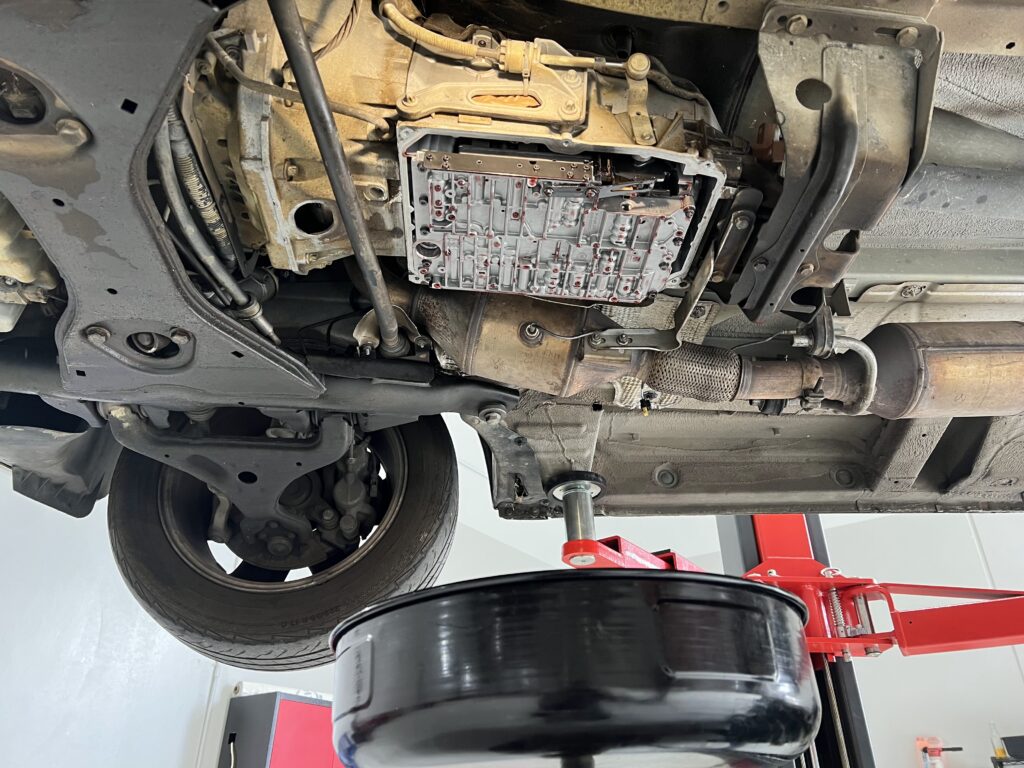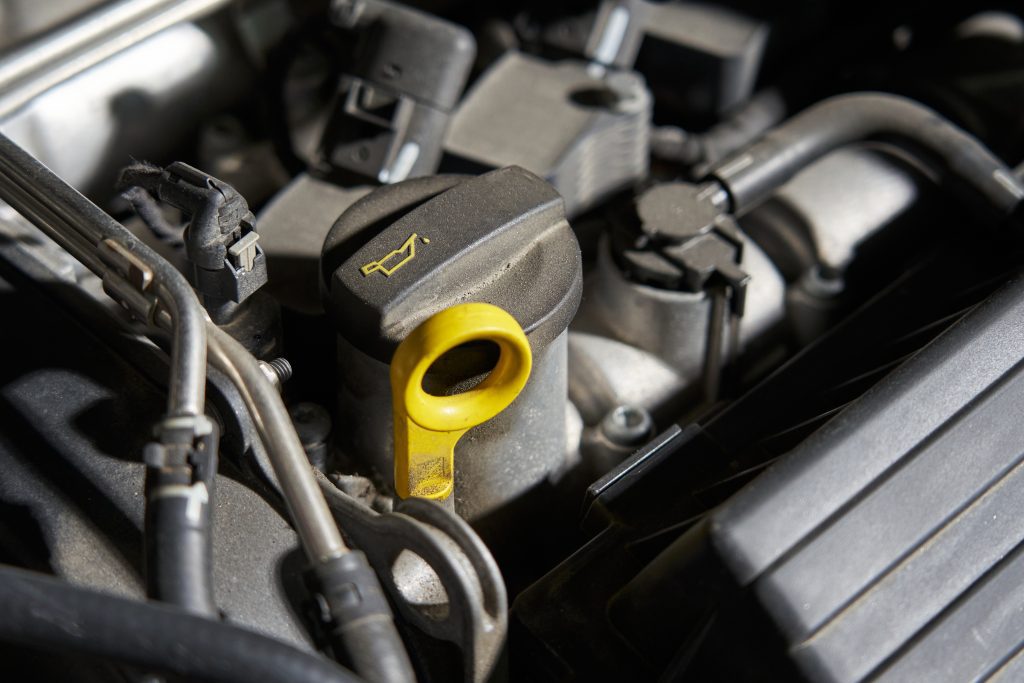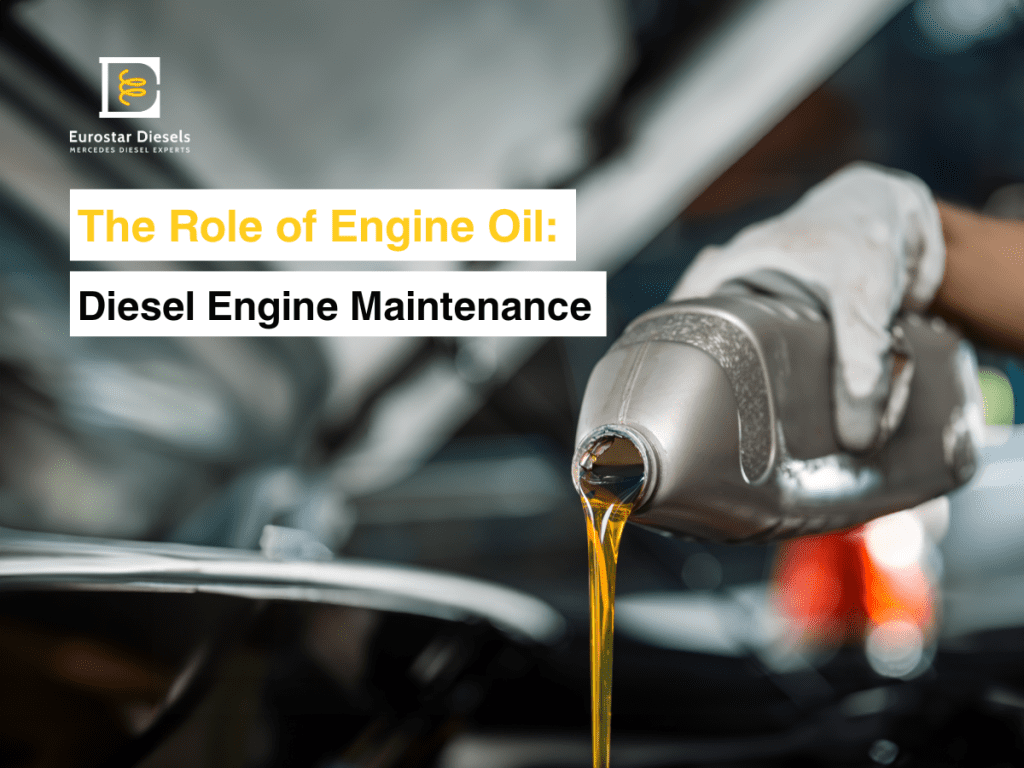Maintaining a Mercedes diesel engine is essential for ensuring its longevity, reliability and optimal performance. Among the various maintenance tasks required, one of the most critical is managing engine oil. Oil serves multiple roles in a diesel engine, and its proper maintenance is crucial for the engine’s health and efficiency. In this article, we will explore the important role of oil in maintaining your Mercedes diesel engine, how neglecting oil can lead to major issues, and why regular servicing is essential. Let’s dive in!

Understanding Engine Oil in Diesel Engines
Engine oil is the lubricant between all of the moving metal objects within an engine. It plays several key roles in ensuring the engine runs smoothly and efficiently, while also protecting it from premature wear.
Lubrication
The primary function of engine oil is to lubricate the engine’s moving parts, including the pistons, crankshaft, and camshaft, which operate at high speeds and under intense pressure and friction. Without proper lubrication, these metal components would grind against each other, leading to premature wear and ultimately engine failure.
Using a high-quality oil, such as an OEM spec oil that we use at Eurostar Diesels, ensures a consistent forming of the thin, protective layer between the parts, minimising friction, and ensuring the smooth operation of your diesel engine as intended by Mercedes-Benz.
Cooling the Engine
While the primary job of oil is lubrication, it also helps to cool the engine. A Mercedes diesel engine generates immense heat during combustion and normal operation, particularly in demanding driving conditions. Although the engine’s cooling system (i.e. coolant, radiator) handles much of the heat regulation, oil plays an additional role by absorbing excess heat and moving it away from critical internal engine components.
Without this cooling effect, the temperature inside the engine could quickly rise to dangerous levels, causing parts to overheat, warp, or crack. Typically, when an engine component warps, it causes them to touch each other and causes major engine damage.
Regularly changing the oil helps ensure it retains its cooling properties, as old, degraded oil can become thickened or even sludgy, and therefore making it less effective at dissipating heat.
Cleaning and Contaminant Removal
A lesser-known function of engine oil is its ability to clean and remove contaminants from the engine. Over time, dirt, carbon particles, metal shavings and other debris can accumulate in the engine, particularly in diesel engines, which tend to produce more soot and contaminants than their petrol counterparts. These contaminants can build up inside the engine, affecting performance, fuel economy, and emissions.
Oil contains special additives that help trap and suspend these contaminants, preventing them from settling on engine components. As the oil circulates through the engine, it picks up and transports these particles to the oil filter, where they are removed. However, the oil itself can become saturated with dirt over time, reducing its effectiveness as a cleaning agent. This is why it’s crucial to follow the recommended oil change intervals.
Regular oil changes ensure that the engine remains clean, reducing the risk of damage caused by harmful deposits and sludge.
Sealing
In addition to its roles in lubrication and cooling, engine oil plays a vital role in sealing the small gaps between the pistons and cylinder walls in a Mercedes diesel engine. Diesel engines operate under significantly higher pressures than petrol engines, making proper compression critical for efficient performance. The thin film of oil that forms between the pistons and cylinder walls not only reduces friction but also helps seal the combustion chamber, preserving the compression needed for optimal power output and fuel efficiency. This tight seal ensures that the engine can generate the necessary force during combustion to maintain a smooth performance.
If the oil quality degrades due to contamination, age, or incorrect viscosity, this sealing effect weakens, leading to reduced compression. Poor sealing can cause issues like power loss, sluggish acceleration, and increased fuel consumption. In severe cases, combustion may become incomplete, resulting in increased emissions and even engine misfires. By using oil that meets Mercedes-Benz’s OEM specifications and adhering to regular oil changes, you can ensure the sealing function remains effective, protecting the engine from performance decline and potential damage over time.
Preventing Corrosion
Diesel engines are prone to condensation and the formation of acidic by-products during the combustion process. When the engine is cool, moisture can condense inside it, leading to the formation of rust on metal parts. Additionally, diesel fuel combustion produces acidic compounds that can lead to corrosion over time. Excessive engine heat can also lead to oxidation, increasing the likelihood of rust forming on certain engine components. This high-temperature corrosion often occurs when there is friction caused by insufficient or degraded engine oil, which fails to properly protect the engine from overheating.
The oil recommended for use in a Mercedes diesel engine contains additives that help neutralise these acids and protect the engine from rust and corrosion. However, these additives degrade over time, especially in harsh driving conditions or if the oil change interval is extended beyond recommended limits. Old oil becomes less effective at preventing corrosion, which can lead to serious damage to internal engine components if left unchecked.
Enhancing Fuel Efficiency and Performance
One of the main advantages of diesel engines is their fuel efficiency, but that efficiency is dependent on proper engine lubrication. When the engine oil is fresh and clean, the moving parts operate with minimal resistance, allowing the engine to run at peak efficiency. Dirty or degraded oil, on the other hand, increases friction, forcing the engine to work harder to achieve the same level of performance. This not only leads to reduced fuel economy but can also impact overall engine power and responsiveness.
By choosing the correct oil and following recommended log book oil change schedules, owners can keep their vehicles running efficiently and smoothly. High-quality oil minimises internal wear, helping the engine perform at its best and preserving the signature Mercedes-Benz driving experience.

Conclusion: The Importance of Regular Oil Changes
Given the critical role oil plays in protecting and maintaining a Mercedes diesel engine, regular oil changes are non-negotiable. Skipping or delaying oil changes can lead to a host of problems that we’ve mentioned, including:
- Increased friction and wear on engine parts
- Reduced fuel efficiency and power
- Build-up of harmful deposits and sludge
- Overheating and engine damage
- Potential corrosion of internal components
Mercedes-Benz recommends oil change intervals that vary depending on driving conditions and the specific model, but as a general rule, oil should be changed approximately every 15,000-25,000 kilometres or annually, whichever comes first. For vehicles that experience heavy use or drive in extreme conditions, more frequent oil changes may be necessary. If you have any questions surrounding oil change frequency on your Mercedes diesel, get in touch with us!
At Eurostar Diesels, we specialise in servicing Mercedes-Benz diesel engines and provide comprehensive oil changes that meet the manufacturer’s specifications. Whether you need a routine oil change or a complete engine check-up, our team of experienced technicians ensures that your vehicle remains in top condition without voiding your warranty.
